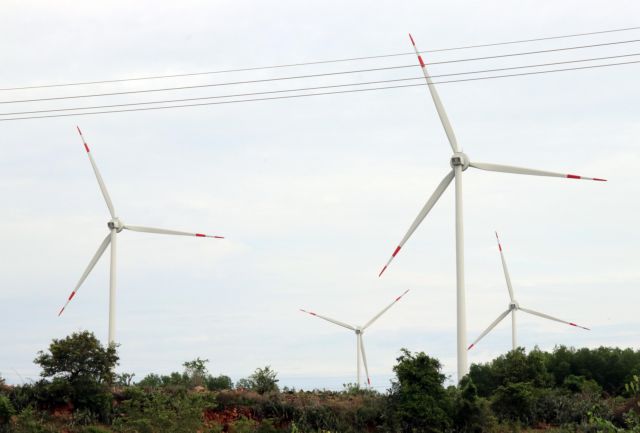.jfif) Opinion
Opinion

Director of the Ministry of Industry and Trade’s Department of Electricity and Renewable Energy Hoàng Tiến Dũng talks to Vietnam News Agency about clean energy development to help Việt Nam reduce dependence on imports.

|
| A wind power plant in Central Ninh Thuận Province. VNA/VNS Photo |
Director of the Ministry of Industry and Trade’s Department of Electricity and Renewable Energy Hoàng Tiến Dũng talks to Vietnam News Agency about clean energy development to help Việt Nam reduce dependence on imports.
The world is facing an energy crisis, putting many countries at risk of power shortages. How do you view this crisis and energy development in Việt Nam?
The global energy crisis originated from stronger connections but many uncertainties remain in the global energy market with five main factors.
First, global energy demand recovered strongly after the COVID-19 pandemic, particularly in China.
Second is the increasing independence of Europe in natural energy sources.
Third, the impacts of energy demand have led to a record increase in gas and coal prices, resulting in electricity price hikes.
Fourth, the Northern Hemisphere countries are entering the winter with extreme weather conditions.
Last, the energy transition from coal to low carbon energy sources also put pressure on energy supply and demand.
Việt Nam is a net energy importer with significant imports of coal and oil at present, and liquefied natural gas (LNG) in the near future. The biggest impact from the current energy crisis on Việt Nam's energy industry is the prices of kinds of imported energies will increase in accordance with global energy prices.
Domestically-produced fuels whose prices are calculated based on global energy prices will also increase at different levels.
Energy is an important output factor in the production process of electricity and other economic activities so it would affect production costs of electricity as well as of businesses.
This will impact the recovery process of the economy of Việt Nam in the future.
From this crisis, what should Việt Nam do to ensure national energy security and gradually transition towards net-zero emissions?
Việt Nam is in the process of energy transition. The increasing proportion of clean energy such as solar and wind power in recent years has helped Việt Nam diversify energy sources and reduce its dependence on imported energy, thus enhancing its national energy security in the long-term.
We need to continue the transition via the implementation of Party and State orientations about the development between new energy and traditional energy.
First, it is necessary to speed up the implementation of measures to save and effectively use energy to reduce energy demand.
The development of renewable energy sources should be stepped up with a feasible roadmap suitable with the investment cost for renewable energy technologies and selling prices of electricity. Attention should be also paid to developing infrastructure serving the import of electricity and primary energy.
These factors needed to be carried out synchronously to ensure the efficiency of the energy transition process of Việt Nam while limiting negative impacts.
For Việt Nam, ensuring the supply of fuel and energy in the short term has not yet faced complicated issues thanks to long-term coal and gas import contracts. However, ensuring the supply of fuel for domestic coal and gas-fueled power plants in the future requires unified management.
At the same time, it is essential to promote the capacity of renewable energy sources and increase hydropower water storage to help reduce pressure on ensuring fuel for power plants.
To promote the transition towards renewable energy while ensuring national energy security, businesses’ interests and stability of the power grid, how should these sources of power be mobilised?
The Party Central Committee’s Resolution No. 55-NQ/TW dated February 11, 2020 on the orientation of the National Energy Development Strategy to 2030 with a vision towards 2045 put forward the orientation of “synchronously and rationally developing and diversifying various types of energies; prioritising full and effective exploitation and use of renewable energies, new energies and clean energies; rationally exploiting and using domestic fossil energy sources, attaching significance to stabilisation, regulation and required reserves of the national energy system; prioritising gas-fired power development and having a suitable roadmap to reduce the share of coal-fired power; and actively importing fuels from abroad for power plants; and optimally allocating the national energy system in all fields due to competitive advantages of each region and locality.”
The development of renewable energy sources must be carried out in harmony with the development of the country's electricity and energy system.
The radical development of renewable energy sources is an inevitable trend, but it is also necessary to consider issues related to ensuring the reliability of power supply, diversification of power sources and ensuring that electricity prices are affordable. This would help to ensure competitive advantages of domestic enterprises in production and business activities.
The development and mobilisation of these sources of power needs to be carried out through synchronous measures as follows:
First, ensuring the progress of power projects and proactively addressing difficulties and obstacles in building and operating such projects.
Second, promptly implementing the construction of transmission lines and substations to reduce capacity burden for existing projects, particularly renewable energy projects.
Third, rationally developing traditional sources of energy with appropriate proportions to ensure power supply.
Fourth, developing flexible sources of power in order to quickly respond to changes in renewable energy generation capacity and electricity load changes.
Fifth, strongly executing measures to manage power demand.
Lastly, speeding up progress of negotiations, signing and import of power. VNS




